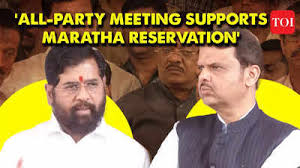Ahmedabad
(Head Office)Address : 506, 3rd EYE THREE (III), Opp. Induben Khakhrawala, Girish Cold Drink Cross Road, CG Road, Navrangpura, Ahmedabad, 380009.
Mobile : 8469231587 / 9586028957
Telephone : 079-40098991
E-mail: dics.upsc@gmail.com

Maratha Quota
Context: The protests in Maharashtra over Maratha quota intensified in the past week. We will understand about the issue here and understand why Marathas are demanding for reservation.
Background:
• The Marathas are a group of castes comprising peasants and landowners, among others, constituting nearly 33 per cent of state’s population.
• The issue is not new with first protest being held over 32 years ago.
| Timeline | Event |
| November 2018 | The then BJP government in Maharashtra passed a Bill proposing 16 per cent reservation in education and government jobs for the Maratha community. This was challenged in court. |
| June 2019 | The Bombay High Court upheld the constitutional validity of the Maratha quota under the Socially and Educationally Backward Classes (SEBC) Act, 2018. While ruling that the 16 per cent quota granted by the state was not ‘justifiable,’ the HC reduced it to 12 per cent in education and 13 per cent in government jobs, as recommended by the Maharashtra State Backward Class Commission. |
| May 2021 | A five-judge Constitution bench of the Supreme Court struck down the Maratha quota, which took the total reservation in the state above the 50 per cent ceiling set by the court in its 1992 Indra Sawhney (Mandal) judgment. |
| November 2022 | After the SC upheld the 10 per cent quota for Economically Weaker Sections, the Maharashtra government said that until the issue of Maratha reservation was resolved, economically weaker members of the community could benefit from the EWS quota |
| Latest Events 2023 | Taking note of Jarange-Patil’s protest, the state on September 7 formed a five-member committee under Justice (retired) Sandeep K Shinde to study the procedure of giving Kunbi (OBC) certificates to Marathas, based on documents, including revenue records, from Nizam period. |
Despite being dominant political force why do Marathas want reservation?
• The identification of majority of Marathas with “agrarian profession” has partly contributed to this demand.
• As long as agriculture was remunerative things were fine. But with families growing in size, land had to be bifurcated. Incomes dwindled and agriculture became increasingly less attractive. The decline of agriculture was not matched with the growth of industry, especially in the hinterland.
• The problem was compounded when in the post-Mandal era, poor Maratha families witnessed the dramatic rise of poorer-than-them families from society’s lower strata. They attributed the rise of Dalits and OBCs to reservation – rightly, in a way.
• It was the first trigger for the Marathas who thought of reservation as the only panacea to their problem.
Which other factors are likely contributors for continued demand for a Sarkari Naukri? (General discussion)
• An important factor relates to the popular perception that, rather than becoming less important, the state has actually become more important.
• There are talks of a market-led society and the spirit of free enterprise, but when this happens in a context of an overweening state presence in everyday life, people are tempted to be part of the state.
• There has no doubt been expansion of private enterprise over the last few decades, but it is accompanied by a situation where the state has abandoned its responsibility towards appropriate regulation of the market. For example, Weak labour laws.
• People realize that there is more respect and stability/security provided by state over private enterprises.
Conclusion
• In the Maratha quota stir the state government is in fix over what can be the right course of action. While politics will play its own course, it is duty of state government in co-ordination with private sector to provide the right jobs, eliminate corruption and listen to the demands of protestors!

Address : 506, 3rd EYE THREE (III), Opp. Induben Khakhrawala, Girish Cold Drink Cross Road, CG Road, Navrangpura, Ahmedabad, 380009.
Mobile : 8469231587 / 9586028957
Telephone : 079-40098991
E-mail: dics.upsc@gmail.com
Address: A-306, The Landmark, Urjanagar-1, Opp. Spicy Street, Kudasan – Por Road, Kudasan, Gandhinagar – 382421
Mobile : 9723832444 / 9723932444
E-mail: dics.gnagar@gmail.com
Address: 2nd Floor, 9 Shivali Society, L&T Circle, opp. Ratri Bazar, Karelibaugh, Vadodara, 390018
Mobile : 9725692037 / 9725692054
E-mail: dics.vadodara@gmail.com
Address: 403, Raj Victoria, Opp. Pal Walkway, Near Galaxy Circle, Pal, Surat-394510
Mobile : 8401031583 / 8401031587
E-mail: dics.surat@gmail.com
Address: 303,305 K 158 Complex Above Magson, Sindhubhavan Road Ahmedabad-380059
Mobile : 9974751177 / 8469231587
E-mail: dicssbr@gmail.com
Address: 57/17, 2nd Floor, Old Rajinder Nagar Market, Bada Bazaar Marg, Delhi-60
Mobile : 9104830862 / 9104830865
E-mail: dics.newdelhi@gmail.com